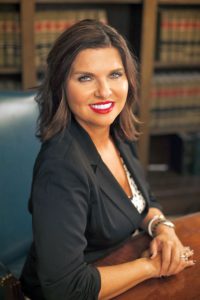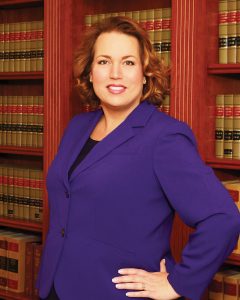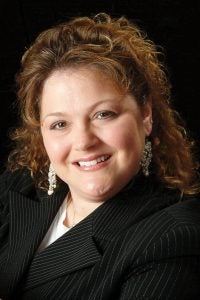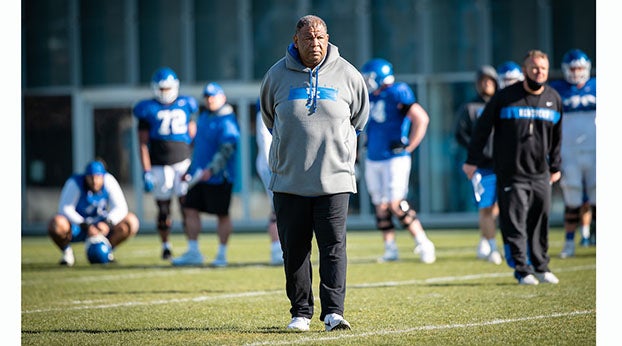Three vying for family court judge
Published 11:27 am Monday, October 24, 2016

Kimberly Blair Walson
KIMBERLY BLAIR WALSON
Kimberly Blair Walson, a partner in the Winchester law firm Blair & Rowady, P.S.C., is a native of Pike County, and 1996 graduate of Eastern Kentucky University.
She is married to retired Judge Jeffrey M. Walson, and has one daughter, Sofie Blair, who attends sixth grade at Baker Intermediate School.
In her past 17 years of practice, she has spent her time and efforts almost exclusively on issues heard in Family Court including, child custody, divorce, child support, domestic violence, child abuse, adoptions and grandparent rights. Kim is one of the few attorneys in the area to have appeared before the Kentucky Supreme Court in a family law case.
As a lawyer, she has assisted families in crisis in over 20 counties in Kentucky, including Clark and Madison.
In addition to being a trial lawyer, Kimberly Blair Walson is certified in Transformative Mediation, the purpose of which is to achieve positive outcomes for families and children without the financial and emotional costs of litigation. She is also trained in collaborative law wherein the parties and their representatives work together to determine a result in the best interest of all involved as opposed to each side simply trying to “win” in the courtroom.
Recently, Walson was named one of the “Ten Best Female Attorneys” by the American Institute of Family Law Attorneys, based upon client satisfaction.

Joan Deaton Grefer
JOAN DEATON GREFER
Joan Deaton Grefer has practiced family law for 21 years in the 25th Judicial Circuit of Clark and Madison counties, protecting central and eastern Kentucky families and children during that time. She is a former recipient of AppalRed’s Pro Bono Publico award, given to attorneys who demonstrate an extraordinary level of dedication and service to the local population.
She is a former president of the Madison County Bar Association and a Kentucky Bar Association-approved lecturer in areas such as divorce and adoption. She is licensed in both Kentucky State and Federal Courts.
She has been married to her husband, Jonathan – who she met in 1986 at the Governor’s Scholars Program at the University of Kentucky – for 20 years. They have a 13-year-old daughter, Meredith, who is following in her mother’s footsteps with the Madison Central Marching Band, even though she’s only an eighth grader at Madison Middle School.
Grefer attended college at Eastern Kentucky University and graduated from the University of Louisville after receiving a full academic scholarship. She received the Book Award at Salmon P. Chase College of Law for achieving the highest marks in Trial Advocacy.
She is the daughter of Geraldine and Charles Deaton, both natives of Breathitt County. Geraldine was a Deputy County Clerk for 18 years, while Charlie worked for the L&N and CSX railroads and was a successful realtor.
Grefer has served as president of the Madison Middle School PTO and as a member of their site-based decision -making council. She is also a former school board member at St. Mark Catholic School, and she and daughter Meredith are lectors at St. Mark Parish. She was active with the 31st Homemakers for many years and has volunteered with many groups and organizations, such as Mock Trial, Special Olympics and Prevent Child Abuse Kentucky.
Joan, Jonathan, and Meredith share their home with two dogs, Gilbert, and Cocoa – who they rescued.

Elizabeth Elkins Bond
ELIZABETH ELKINS BOND
Elizabeth Elkins Bond was raised in Madison County by Dennis and Nelvia Elkins, a minister and homemaker, alongside three siblings.
After graduating high school, she attended Eastern Kentucky University, graduating with a Bachelor of Science in Psychology. Subsequently, she obtained her Juris Doctor from UK College of Law in May 2002.
Shortly thereafter, she moved her young family to Clark County, where her law practice was located. She remained a resident of Clark County for the last 13 years.
She has two children, Blake, 12, and Isabella (Bella), 4.
She is a member in good standing of the United States Supreme Court Bar, the United States District Court, Eastern District of Kentucky, the Kentucky Bar Association and the Clark and Madison County Bar Associations.
She has served as treasurer, vice president and president of the Clark County Bar Association as well as the treasurer of the Clark County Law Library Board of Trustees.
She was also a member of a Family Drug Court Training Team in an effort to bring Family Drug Court to Clark and Madison counties.
Throughout the years, she has practiced primarily in Clark and Madison Family Courts, and has handled many cases in other family courts in an around central Kentucky.
She also volunteered as a Clark County Teen Court mentor attorney from 2003-2014, and was actively involved in volunteering as a judge for Mock Trial at the middle and high school levels.
She has served on the Board of Directors for the Clark County Children’s Council, secretary of Habitat for Humanity of Clark and Madison Counties, and vice president and immediate past president of Hope’s Wings, Inc.
The office of Family Court Judge is not a race that can typically be run on “the issues.” Why do you think voters should care about this office? How do the outcomes of this race affect Clark County families?
KW: Voters are more likely to come in contact with this office than any other on the ballot. As Family Court Judge, I will be ruling on cases involving divorce, custody, child support, adoption, grandparent visitation, domestic violence and child dependency, neglect and abuse cases. Most everyone or someone with whom they are close has been involved in one of these types of cases.
JG: It is far more likely that a voter will wind up in Family Court than in any other courtroom. Family Court addresses divorce, paternity, child support, custody, visitation, adoption, domestic violence and dependency, neglect and abuse cases. These are, for the most part, not pleasant issues, but they are common ones. The judges who preside over those cases must be, above all else, fair to everyone. I have spent my entire career — in fact, my entire life — treating people fairly. I was brought up that way — from the janitor to the CEO, child and adult alike, everyone deserves to be treated fairly and with respect. That’s how I live my life, it’s how I run my practice, and it’s how I would conduct my courtroom.
EB: The office of Family Court Judge is one of the most important offices in our community as Family Court is where the most serious and life changing decisions are made about the core foundation of our society — our families and children. Family Court deals with families in crisis on a daily basis, whether it is divorce, custody issues, neglect and abuse of children, termination of parental rights, support of our children and so much more. Voters should care about this office because the person selected as the next Family Court Judge will have a far-reaching impact for the families and children in our community and beyond for the foreseeable future.
Everyday life stresses and tragedies faced by our families and children in today’s world have contributed to the deterioration of society. Children who grow up in homes where there is domestic violence, drug abuse, lack of stability, lack of supervision and/or other issues, often repeat those same patterns in their lives as they grow into adulthood, perpetuating the same issues for a whole new generation.
If we don’t effectively deal with the issues facing our community’s families and children, we will indeed lose the biggest battles facing our community.
What sort of reform to the juvenile justice system is needed, in your opinion?
KW: There are two broad categories of juvenile cases: delinquency and status.
When a youth is accused of having committed a crime, it is a delinquency offense heard in District Court. A very small percentage of the Family Court docket is classified as status cases where children are accused of being beyond the reasonable control of their school or parents or habitually truant from school. The legislature recently made sweeping reforms to the status laws in an effort to reduce the number of those children sent to court. Now, a designated group of community partners collaborate to correct the behavior of at–risk youth and only those who are unsuccessful are sent to court. However, if this paradigm is to continue, the legislature must give both education professionals and courts the tools necessary to work together to help kids get on the right track.
JG: The issues facing our children today are vastly different from the issues kids dealt with over 20 years ago, when I began practicing. The heroin epidemic was non-existent then, but it has us in its grasp now, and we must be both vigilant and proactive in addressing it. We have some incredible tools in our toolbox, but one thing that needs to change is we need to make the public more aware of what those tools are, and how to use them effectively — tools like Casey’s Law, which allow family members to petition the courts for an order compelling in-patient drug treatment when the addict may not be able to recognize his/her own need for help. We can’t always wait for our addicted loved ones to “hit rock bottom,” because with heroin, “rock bottom” is death. We have a record number of children being born today to addicted mothers, and unless we break the cycle, the epidemic will only grow. By working in concert with law enforcement, mental health professionals and treatment facilities, the court can help break the cycle, and we can take our families back.
EB: I have spent a great deal of my legal career practicing in the juvenile justice system as I firmly believe that, as Frederick Douglas once said, “it is easier to build strong children than to repair broken men.”
I have seen first-hand many of the pitfalls experienced by the children who have come into contact with the juvenile justice system. Having a child with any charge in the court system is stressful to all family members as well as the child who has been charged. Truly, juvenile justice is a family problem and not just a problem for the youth.
I believe often times, cases come into the system without available and appropriate interventions being used first.
In those cases, the court should immediately order those supportive services to help guide the youth and support the families be implemented before proceeding.
In the cases that don’t fall into that category, the court should seek to use more evidence-based interventions coupled with more thorough assessments of the family as a whole to determine the root of the issue and appropriate solutions. These reforms would hopefully allow children to remain in their communities as well as improving public safety.
Family court cases are typically handled behind closed doors and records are not open to the public. The state appeals court recently ruled in favor of two Kentucky newspapers’ right to access child-abuse records withheld by the Cabinet for Health and Family Services. Do you believe there needs to be transparency for how cases are handled by family courts? Or do you think it is best to protect the privacy of these families?
KW: Transparency of the process and privacy interest of families does not have to be mutually exclusive. Of course the press and the public should be informed about how cases are handled, statistics and the like— we need far more public awareness about the high rate of child maltreatment in our communities. But children who are abused or neglected deserve not to be stigmatized by having their names or the details of their mistreatment made public. There are currently pilot courts in Kentucky experimenting with how to strike the right balance between these two goals. Once enough data is collected and processed by the Kentucky Supreme Court and the legislature, we can probably expect changes in the law regarding confidentiality.
JG: We have traded transparency for convenience in some situations – in this circuit, for example, where space constraints in our courtrooms mandate that divorce cases be heard one at a time because there isn’t enough space for everyone to sit in the courtroom all at the same time. (Divorce files ARE open records, though, so the public can access them via the clerk’s office.) However, I do agree that juvenile court matters, such as cases dealing with dependency, neglect and abuse, should be conducted behind closed doors, to protect the child-victims involved. The law mandates that we focus on what is in the best interest of the child, and that should be our first and foremost concern.
EB: I believe that transparency is a tool to help agencies learn from each other and improve their practices. Allowing these cases to be open to the public would give everyone the opportunity to see how complex and difficult family court cases truly are to resolve. These cases require cooperation from multiple agencies such as community resources, mental health providers, Cabinet for Health and Family Services and the school system, alongside the family.
However, where transparency conflicts with the best interests of children, I’ll fall every time on the side of the children. I don’t feel that it is in a child’s best interests to have their abuse or neglect available in a way that readily identifies them and the struggles that they’ve endured. These children have often already been traumatized and should be entitled to the safety that a closed proceeding provides. Serving as an attorney for thousands of these children over the past 14 years, I’ve learned that a closed proceeding preserves the dignity of the child and the family, and further protects the child from public scrutiny.
If put in their shoes, I believe any of us would want that same protection for our child and our family.
What are the greatest challenges facing Clark County families? How are you uniquely qualified to address these challenges?
KW: Sadly, the heroin epidemic is destroying many families right here in our community. Family Court judges have always had to deal with the hard issues like child abuse and neglect and domestic violence, and these cases are most often intertwined with substance abuse. Heroin has now caused this correlation to skyrocket. Now, it is not enough for a family court judge to sympathize and think, “Oh my, that’s really bad.”
As blessed as I am now (due in great part to hard work in an effort to rise above it), as a child I was exposed to both alcohol addiction and domestic violence. I do not just sympathize, I have lived it. My work experience helping families in crisis and my ability to understand and truly empathize combine to make me uniquely and precisely qualified for this position.
JG: Clark County families are facing the same issues as families everywhere – a pervasive drug epidemic, a “me”-centered society that has lost empathy for the plight of our neighbors, financial instability. I am in the unique position to help for a number of reasons: First and foremost, I simply have more experience than anyone else running for this job. Over the last twenty-one (21) years as an attorney practicing in this circuit, I have developed a strong working relationship with law enforcement and our social service agencies. I know what resources we have and I know what resources we need. I know how drugs affect our families, and I know how financial issues impact our relationships. I have always believed, and continue to believe, that the law is a service profession, and I see the bench as another ability to serve. I am focused on what is fair and what is best for everyone in this circuit, and I will make strengthening our families my top priority.
EB: Clark County families are facing the same or similar challenges faced by other communities across our state, such as substance abuse, domestic violence, mental health and poverty. More often than not, our families face a combination of these issues, which ultimately brings them before the Family Court. Throughout my years of practice, I have worked closely with children, families, community resources, mental health providers, the Cabinet for Health and Family Services and the school system to identify the issues of concern within a family and to craft workable solutions the family will be able to use long after their court case is closed.
I have also worked with Hope’s Wings, Inc. Domestic Violence Shelter, the Clark County Children’s Council, Habitat for Humanity of Clark and Madison Counties and been a member of a Family Drug Court Training team.
It is my sincere belief that individual families and children are the foundation of our future. I have spent my entire legal career, as well as my volunteer efforts, immersed in efforts to assist and stabilize our children and families. I feel passionately about helping families be successful despite the challenges they face.






